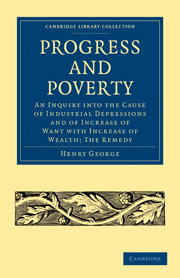 Progress and Poverty
Progress and Poverty Book contents
- Frontmatter
- PREFACE TO FOURTH EDITION
- Contents
- INTRODUCTORY
- BOOK I WAGES AND CAPITAL
- BOOK II POPULATION AND SUBSISTENCE
- BOOK III THE LAWS OF DISTRIBUTION
- BOOK IV EFFECT OF MATERIAL PROGRESS UPON THE DISTRIBUTION OF WEALTH
- BOOK V THE PROBLEM SOLVED
- BOOK VI THE REMEDY
- BOOK VII JUSTICE OF THE REMEDY
- BOOK VIII APPLICATION OF THE REMEDY
- BOOK IX EFFECTS OF THE REMEDY
- BOOK X THE LAW OF HUMAN PROGRESS
- CONCLUSION
- INDEX
- Frontmatter
- PREFACE TO FOURTH EDITION
- Contents
- INTRODUCTORY
- BOOK I WAGES AND CAPITAL
- BOOK II POPULATION AND SUBSISTENCE
- BOOK III THE LAWS OF DISTRIBUTION
- BOOK IV EFFECT OF MATERIAL PROGRESS UPON THE DISTRIBUTION OF WEALTH
- BOOK V THE PROBLEM SOLVED
- BOOK VI THE REMEDY
- BOOK VII JUSTICE OF THE REMEDY
- BOOK VIII APPLICATION OF THE REMEDY
- BOOK IX EFFECTS OF THE REMEDY
- BOOK X THE LAW OF HUMAN PROGRESS
- CONCLUSION
- INDEX
Summary
My task is done.
Yet the thought still mounts. The problems we have been considering lead into a problem higher and deeper still. Behind the problems of social life lies the problem of individual life. I have found it impossible to think of the one without thinking of the other, and so, I imagine, will it be with those who, reading this book, go with me in thought. For, as says Guizot, “when the history of civilization is completed, when there is nothing more to say as to our present existence, man inevitably asks himself whether all is exhausted, whether he has reached the end of all things?”
This problem I cannot now discuss. I only speak of it because the thought which, while writing this book, has come with inexpressible cheer to me, may also be of cheer to some who read it; for, whatever be its fate, it will be read by some who in their heart of hearts have taken the cross of a new crusade. This thought will come to them without my suggestion; but we are surer that we see a star when we know that others also see it.
The truth that I have tried to make clear will not find easy acceptance. If that could be, it would have been accepted long ago. If that could be, it would never have been obscured.
- Type
- Chapter
- Information
- Progress and PovertyAn Inquiry into the Cause of Industrial Depressions and of Increase of Want with Increase of Wealth; The Remedy, pp. 497 - 508Publisher: Cambridge University PressPrint publication year: 2009First published in: 1881


